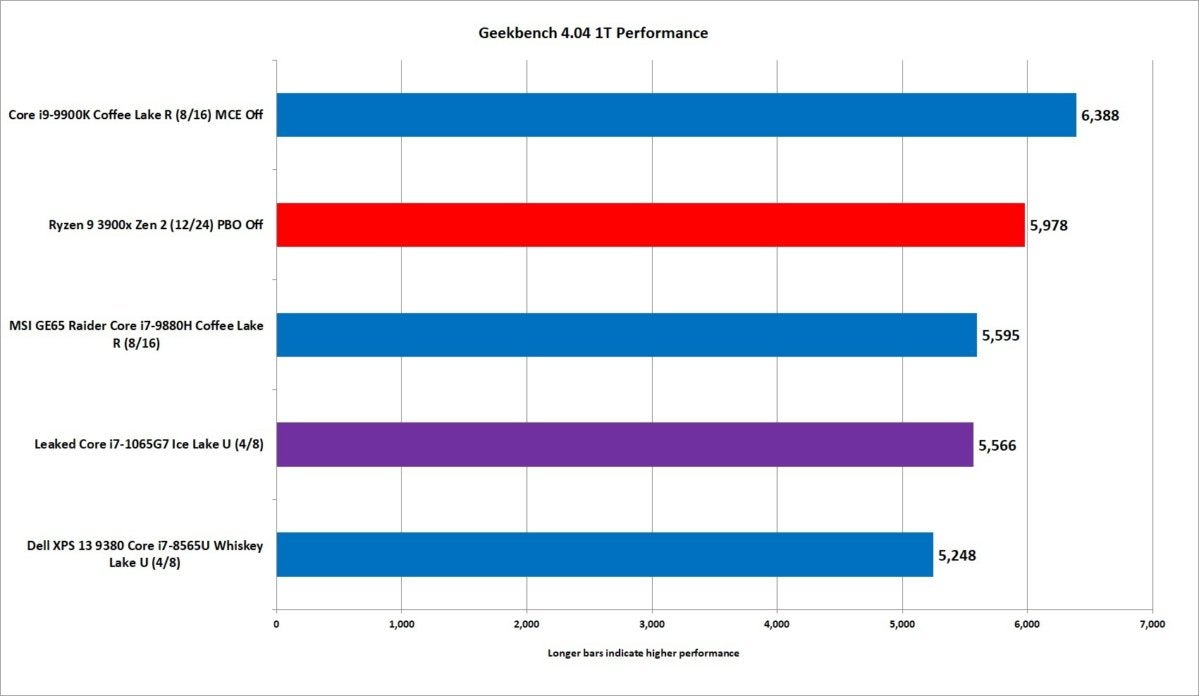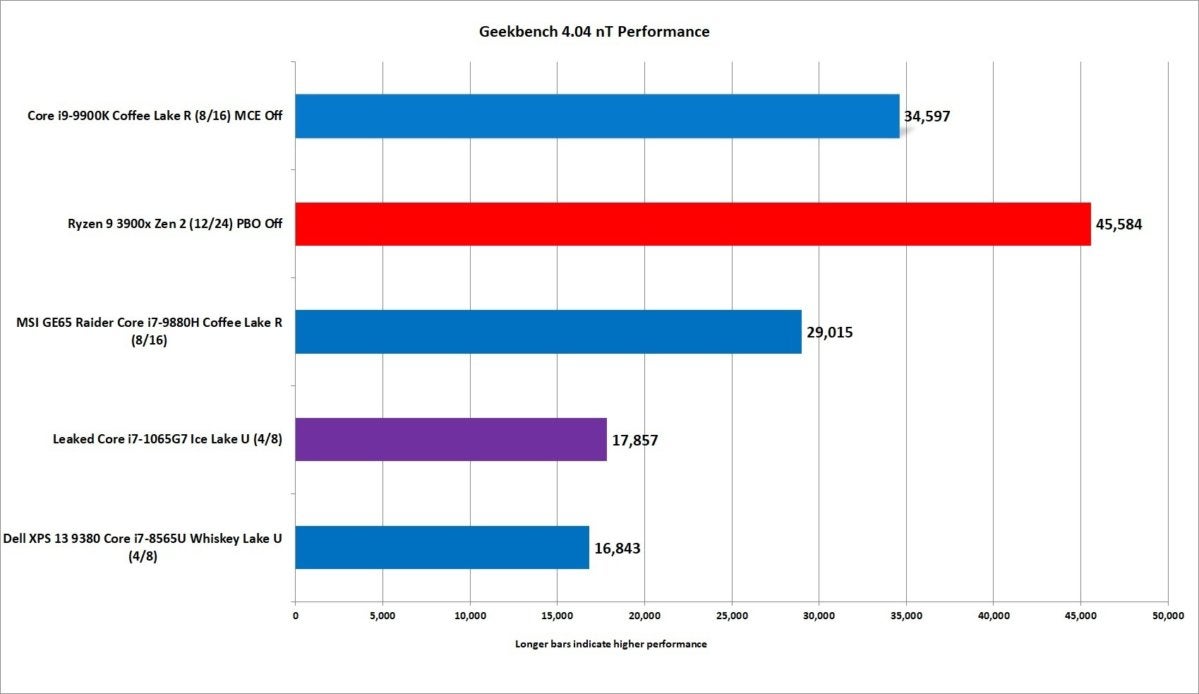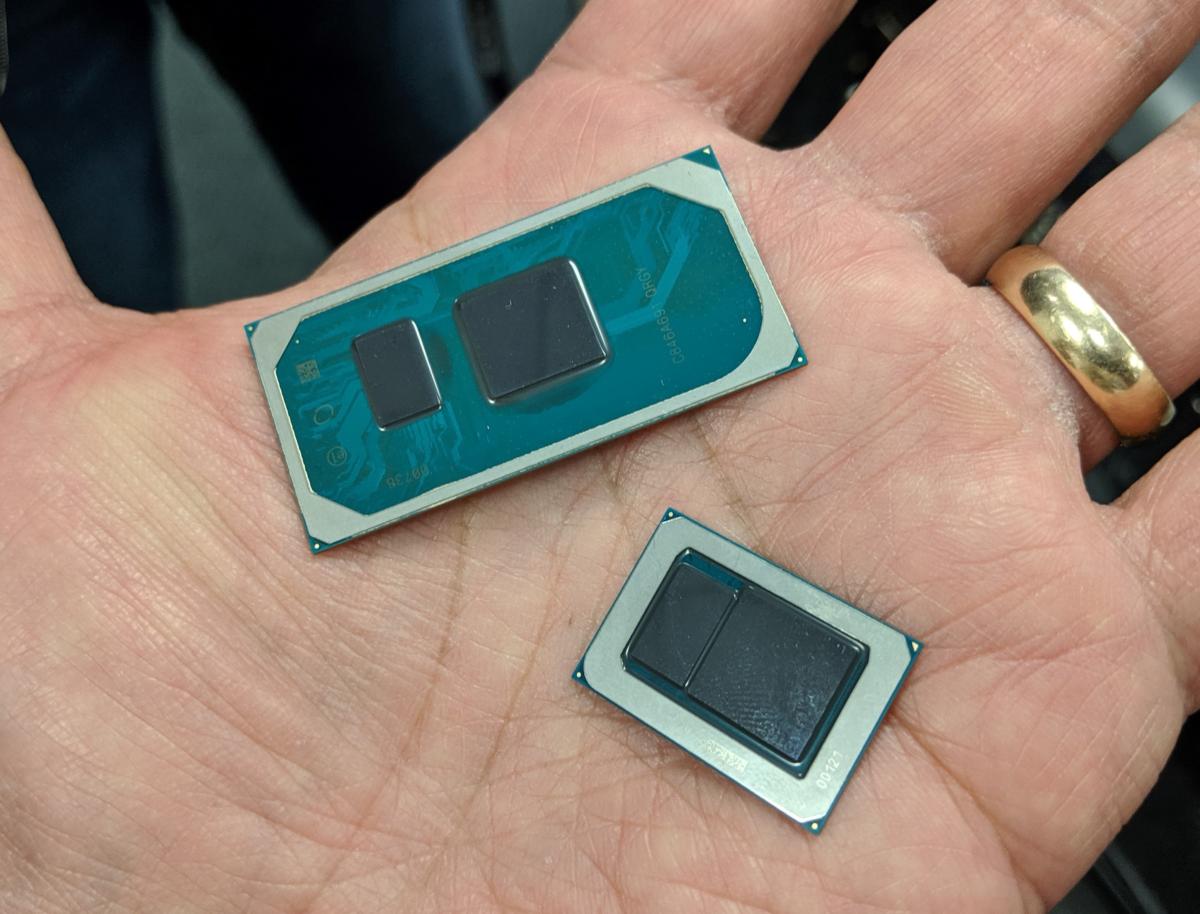If you read news stories this week of Intel’s upcoming 10th-gen Ice Lake mobile processor beating, obliterating, stomping, or otherwise surpassing AMD’s new Ryzen 9 3900X in performance, you might just want to pump the the hype brakes.
As always before a CPU launch, the inevitable “leaked” benchmarks make the rounds. The Internet found itself hyper-ventilating this week over the thought of a tiny mobile 15- or 28-watt Intel Ice Lake Core i7-1065G7 mercilessly pummeling a big desktop 105-watt Ryzen 9 3900X.
The leaked score was apparently run on an HP Spectre x360 13 and then uploaded via Geekbench’s online database. The most widely quoted result gives the upcoming Core i7-1065G7 a score of 5,691 for single-threaded performance, with multi-threaded performance at 17,741.
Although the 4-core multi-threaded result won’t set any records, most sites emphasized the single-threaded score of 5,691—compared to a Ryzen 9 3900X’s single-threaded score of 5,624. Whoa.
To see just how this purported score stacked up against our own Ryzen 9 3900X, we broke out the latest Geekbench and ran it on that and a Core i9-9900K, as well as an 8th-gen Core i7-8565U Whiskey Lake laptop and a 9th-gen Core i7-9880H laptop.
Let’s just say we aren’t exactly declaring doom yet. The leaked result is in purple, below, while Ryzen 9 3900X is in red.
 IDG
IDG
Leaked performance data showing Intel’s upcoming Ice Lake mobile chip looks decent but no, it doesn’t quite surpass desktop chips yet.
As you can see from our results, it’s not quite what many stories have made this out to be. The Ryzen 9 3900X we tested scored closer to 6,000 and is in no risk of being obliterated by the leaked Ice Lake scores (not yet, anyway). The typically 4.8GHz to 5GHz Core i9-9900K easily beats all, while the 4.5GHz to 4.6GHz Ryzen 9 3900X also does well.
We don’t know how most news stories automatically assigned the Ryzen 9 3900X the lower 5,624 score. We should also note that single-threaded performance in short benchmark runs, where most of the CPUs boost from 4GHz to 4.8GHz, tends to be very close anyway. Multi-threading, or processing very heavy and long-running tasks, are what separate the chips. You can see that below where, well, it’s not that big of a deal.
 IDG
IDG
A leaked 10th gen Geekbench score has people drooling, but there’s no reason to get too excited just yet.
Public, anonymous Geekbench scores can be all over the map. You don’t know whether a particular person was testing with cores locked to a lower clock speed, or playing with RAM scenarios.
Geekbench itself (which has been the focus of ire in the past) has really come a long way as a tool, and can be valuable when used in the right context. Unlike a 3D modelling benchmark such as Cinebench, which really tests only one aspect of a CPU, Geekbench measures a raft of performance aspects, using custom loops it believes represent current needs in cryptography, image editing, and compression, as well as memory bandwidth and latency. The test actually details subscores for each category but also creates a composite score, which most people refer to for their Internet arguments.
Some of the framing between the CPUs is also a little out of context. The leaked result was likely from a 15-watt configuration of Ice Lake. Framed against a 105-watt desktop Ryzen 9, that means even more, right? Well, probably not as much as you think. The 105-watt TDP of the Ryzen 9 represents its use with all cores and threads being used. Under a single-threaded load, the Ryzen 9 would produce far less dissipated heat. A 10th-gen Ice Lake using a single thread would probably produce less heat than its 15-watt TDP rating, too.
We’re basically saying that trying to pit a 10th-gen Core i7 mobile CPU against a desktop Ryzen 3000 using leaked benchmarks is not worth much debate.
 Gordon Mah Ung / IDG
Gordon Mah Ung / IDG
Intel’s 10th gen Ice Lake is something to get excited about against other Intel laptop chips.
10th-gen Ice Lake will likely be potent
None of this suggests we should dismiss the potency of Intel’s 10th-gen Ice Lake chip. Intel claims up to an 18-percent efficiency increase over the previous 8th-gen chip. It's also the first chip to use Intel's long-awaited 10nm process, and it’s the first redesigned core since the 7th-gen Kaby Lake. Although it's likely to run at somewhat lower clock speeds, it should still easily outperform the current 8th-gen Whiskey Lake Core i7-8565U chips. The latest leak seems to back that up.
If you recall the results from our own Geekbench testing above, the leaked 10th-gen Core i7-1065G7 in a convertible laptop appears to outrun Dell’s XPS 13 9380 with a Core i7-8565U Whiskey Lake CPU. That’s significant, because based on our review of Dell’s XPS 13 9380 it's among the fastest of the current Whiskey Lake U clamshell laptops that we’ve seen to date. When you factor in that most convertible laptops typically underperform clamshell laptops, then we’ve got a ball game.
If you want one more sign that we should pay attention to 10th-gen Ice Lake—it’s the other laptop in this list: an MSI GE65 Raider with a 9th-gen, 8-core Core i9-9980H. In single-threaded loads it can hit 4.8GHz under Turbo Boost. Geekbench scores both as the same. Why? Well, it’s likely due to the 10th-gen’s improvements to encryption, AVX 512, and support for LPDDR4, which Geekbench's composite benchmark test measures, among many other things.
But again: It’s way to early to draw any conclusions. Just sit back and wait for the hardware to come out.
https://www.pcworld.com/article/3410589/is-ice-lake-better-than-ryzen-9.html
2019-07-25 10:14:00Z
52780338703147
Bagikan Berita Ini














0 Response to "Yeah, about that Ice Lake demolishing Ryzen 9 thing - PCWorld"
Post a Comment